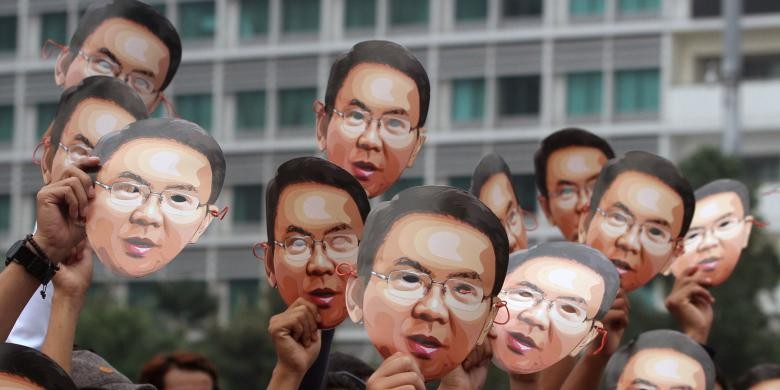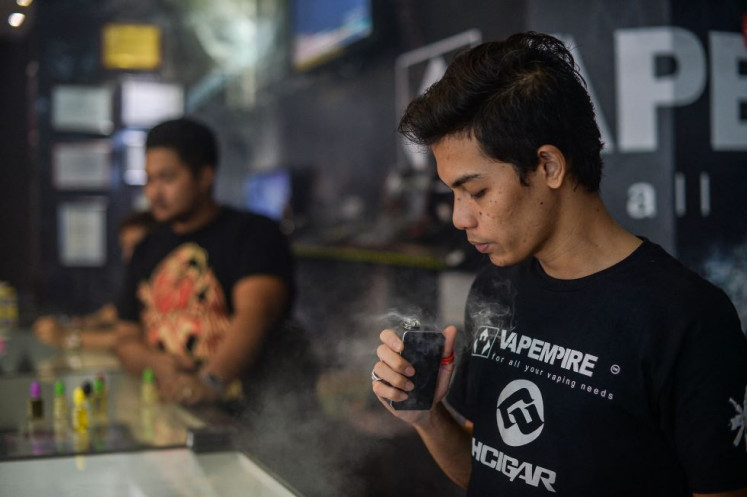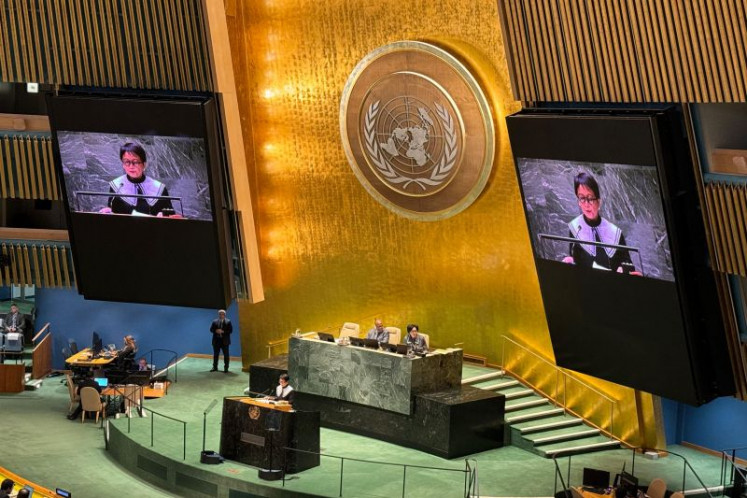COMMENTARY: Ahok needs smarter, more empathetic supporters
Change Size
 Members of Teman Ahok or Friends of Ahok gathered supports for Jakarta Governor Basuki "Ahok" Tjahaja Purnama by spreading petitions in Hotel Indonesia Traffic Circle in this file photo taken on March 1, 2015. (Tribunnews.com/Dany Permana)
Members of Teman Ahok or Friends of Ahok gathered supports for Jakarta Governor Basuki "Ahok" Tjahaja Purnama by spreading petitions in Hotel Indonesia Traffic Circle in this file photo taken on March 1, 2015. (Tribunnews.com/Dany Permana)
L
ove him or hate him — the nomination of Governor Basuki “Ahok” Tjahaja Purnama as a candidate in the upcoming Jakarta gubernatorial election will be a test case for Indonesian democracy.
It is a landmark event that symbolizes historic shifts in our political culture. Ahok, a Christian of Chinese descent, is the first double minority to top political surveys in Jakarta, dwarfing other candidates claiming to represent — ethnic and religion wise — the majority. Being politically savvy, Ahok remarkably managed to secure a nomination from the Indonesian Democratic Party of Struggle (PDI-P) and the Golkar Party, the nation’s largest parties, which had previously slammed the governor for showing enmity toward political parties.
We have come a long way since National Mandate Party (PAN) stalwart Amien Rais formed the Axis Force alliance at the House of Representatives to block the election of PDI-P leader Megawati Soekarnoputri as president just for being a woman. Look at PAN now. The party practically begged Megawati to bring Surabaya Mayor Tri Rismaharini, a woman, to challenge Ahok, whom Amien dubbed dajjal or the Antichrist.
Indonesian democracy has progressed, with Ahok’s rise often cited as its clearest evidence. But it is certainly far from perfect and has yet to be proven advantageous for Indonesians of all stripes. The country is still struggling to realize its potential, and its capital is still mired by urban problems like flooding and traffic congestion.
One problem is that after the 2014 presidential election that bitterly divided the nation, Indonesians have yet to move on from the euphoria of electoral politics, with Jokowi and Ahok regarded as messianic and infallible political rock stars that will magically solve all of the nation’s ills.
The rise of social media has only exacerbated the matter by reducing public participation in politics into mere “fanboyism”, with netizens now pigeonholed into Jokowers, Ahokers and Prabowers. With Jokowi’s approval ratings now standing at 66 percent, according to a recent survey, and Ahok’s popularity at more than 40 percent, according to various pollsters, we may soon be witnessing both men’s popularity soaring to the point of being too popular, and therefore too powerful, to leave room for criticism.
There is no denying that Ahok remains the favorite candidate in the Jakarta election. With the PDI-P now backing his candidacy, analysts have forecast smooth sailing for Ahok in the polls.
But democracy is more than just elections. Having Ahok as the winner of the gubernatorial election will certainly be a milestone for Jakarta as well as Indonesia, but it is by no means the endgame of our democratic struggle.
Democracy is also a way to create an effective government that could produce public policies that would benefit all. Having said that, public participation in the policy making process long after the election season is over is as crucial as coming to the voting booths on election day.
In Jakarta, a city that faces some of the worst urban problems in the world, having a healthy discussion to find solutions to those problems is even more imperative. Sadly, this is not happening under Ahok’s leadership.
Ahok is a one-man show who has repeatedly claimed that only he alone can safeguard the city’s budget and programs, a claim he used as a pretext for his bid to keep working during the campaign period.
Ahok has ignored protests against the city’s reclamation project, which is plagued by legal, environmental and social complications. Even if the governor is in the right on reclamation, the glaring lack of public hearings at City Hall and the City Council regarding the project’s advantages and disadvantages, and the fact that the go-ahead for the project is determined by a power struggle among Cabinet ministers is reprehensible.
The reclamation of Jakarta Bay is a public issue and its fate should not lie in the hands of Ahok or Coordinating Maritime Affairs Minister Luhut Pandjaitan — a close aide to Jokowi and a powerful man in the Cabinet — alone. Maritime Affairs and Fisheries Minister Susi Pudjiastuti has long been strongly opposed to the project, while Environment and Forestry Minister Siti Nurbaya still has reservations about it, even though she has, reluctantly, given her approval.
If a Cabinet minister as blunt as Susi can be silenced, how can civil society groups sway Ahok and the government’s decision?
Ahok also has deplorably shut down any room for dialogue regarding his ruthless eviction policy, overlooking possible alternatives offered by academics to manage slum areas and prevent flooding without having to destroy the livelihood of the urban poor living on the city’s riverbanks.
How can Ahok get away with all of that?
Many have said Ahok is lacking smart haters, with many of his critics focusing their criticism more on his ethnicity, religion and personality than his policies. But the bigger problem may not be that Ahok is facing a deficit of smart haters.
With many of his controversial policies going without scrutiny, the main issue could be that Ahok’s supporters have become so uncritical they stand behind him against any public backlash caused by his policies.
In what can only be described as a sign of anti-intellectualism, Ahokers on Twitter have gone as far as slandering the media, dismissing urban planners’ analysis and accusing human rights activists of exploiting the poor for aid money just for criticizing Ahok’s policies.
That is not democracy, but authoritarian populism.
At the end of the day, this election is not about Ahok, but Jakarta. And the support Jakartans lend to Ahok should be understood as an attempt to make Jakarta a better place for everyone. Defending Ahok for many of his questionable policies will help neither Jakarta nor him.








